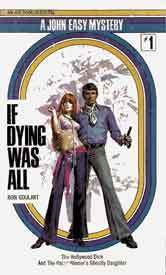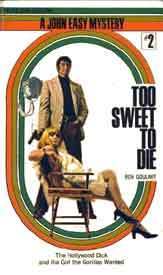Ed Gorman's Blog, page 157
June 10, 2012
The very Hollywood tale of the producer and Black Panther
To his credit Bert Schneider supported many, many worthy causes all by himself. He was a generous man. But his relationship with Huey Newton was another matter. I want to say here that the Chicago cops did in fact murder in cold blood six Black Panthers and got away with it. But as understandable as the Panthers seemed at first the more honest brokers among left wing reporters started filing stories about Huey Newton's deranged ego and murderous temper. Tom Wolfe was criticised by the left for his attack on Radical Chic (he coined the phrase in fact) but as Kate Coleman shows here, even Wolfe cut the Chicers a lot of slack.
KATE COLEMAN
Bert Schneider craved rebel cachet, Huey Newton his cash. The very Hollywood tale of the producer and Black Panther FROM SALONBY KATE COLEMAN
More than three decades ago, as I was winding up a major investigation of the Black Panther Party (BPP) and its leader Huey Newton, I received a call from Abbie Hoffman, the antic anti-Vietnam War activist, then a fugitive from criminal charges for selling cocaine to a nark. Abbie and I had been friends and fellow street-fighting buddies on the Lower East Side in numerous demonstrations of the antiwar Yippies. His purpose, he said, was to talk me out of publishing that 1978 investigation in New Times. It would hurt the left and the struggle for black justice, he warned.My story exposed Newton’s bizarre leadership (for a time he carried a swagger stick à la Idi Amin). Far worse was the extortion racket he presided over that shook down pimps, drug dealers, after-hours clubs and even a theater owner. Non-compliance left one club owner dead and undiscovered for days in the trunk of his car, which was parked at the San Francisco airport. The theater owner, Ed Bercovich, declined the tithe and refused to give jobs to Panther thugs. The theater burned down — it was arson. Murders of rivals were also carried out on orders from above for perceived disloyalty to the Panthers; vicious beatings of lower-rank Panther males were regular punishments, along with turning out Panther women as prostitutes in the Panther-owned bar and restaurant the Lamp Post. The Panthers always needed cash for themselves and their programs. Paranoia was rampant, with internal schisms fanned by the FBI and local red squads of the police but also anchored in the egos and fear of rivals.Newton had a way of being tough on the streets, the mean streets of Oakland he grew up in, but he managed to conceal it from his respectable friends, black and white. He cultivated liberal politicians such as U.S. Rep. Ron Dellums and state Rep. Tom Bates; a host of celebrities, including Marlon Brando, Jane Fonda and Dennis Hopper; and opinion leaders such as Yale president Kingman Brewster, author Jessica Mitford and conductor Leonard Bernstein, all of whom became supporters of the Panthers.At first, I was puzzled as to why Abbie would call me from the underground after a long silence — he was a fugitive, after all. Suddenly, in a flash, I knew: “Did Bert put you up to this?” I asked.“Yeah,” he admitted sheepishly. Bert Schneider, I already knew, had underwritten Abbie’s fugitive existence, just as he had for Huey Newton. I turned Abbie — and Bert — down: The Panther investigation would run.for the rest go here:http://www.salon.com/2012/06/09/true_...
June 9, 2012
The John Easy books Now available in e books

John Easy
Created by Ron Goulart
.
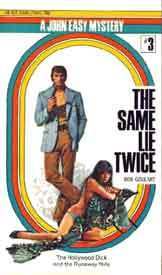 ...
...
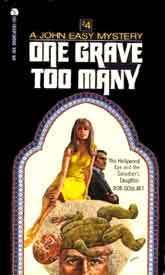
Ed here: One of the abiding pleasures of the late Sixties and early Seventies was reading Ron Goulart's take on them in his very sleek and cool (all right--groovy) John Easy p.i, mysteries. Now Otto Penzler's great Mysterious Press e website has published three of them in e book form. Ron assures me that The Same Lie Twice will be available soon. http://mysteriouspress.com/authors/
If Dying Was All by Ron Goulart
Too Sweet to Die by Ron Goulart
One Grave Too Many by Ron Goulart
June 8, 2012
THE book
Dan Downing says:05/05/2012 at 2:29 pm
All great picks; Kent Anderson is always a pleasant name to see. Wish he wrote more, understand why not.
I think McBain never got the recognition some other writers received because he had other persona. When “Blackboard Jungle” became required high school reading for at least a generation a mark was set. In writing his other books—and he had at least a half dozen pen names besides those mentioned here—I believe he tended to his craft, telling good stories well, filled with meaty characters, but he was not the kind of writer who took a book, wrote it, took it apart, re-wrote it, polished the prose, and so forth—not a Flaubert. He never took those extra steps most writers need to take to make, as pointed out—THE BOOK. Aside, of course, from Blackboard Jungle, which came early and maybe received a bit of TLC, but was Evan Hunter.
June 7, 2012
Forgotten Books: Learning To Kill by Evan Hunter
A year or so before he was diagnosed with cancer, Evan Hunter seemed intrigued by my idea of doing a massive collection of some of his earliest tales. Intrigued enough, anyway, to have somebody make copies of sixty-some stories and send them to me.
The stories covered virtually every pulp genre – crime, western, adventure, science fiction, horror – done under seven or eight pen-names.
We had everything ready to go when Evan had second thoughts. There were just too many of these stories he didn’t want to resurrect.
In Learning to Kill (Harcourt, $25) Evan and Otto Penzler have brought together the very best of those early stories in a stunner of a hardback package. This shows you how early Hunter was a master of both form and character.
The stories are divided into categories: Kids, Women in Jeopardy, Private Eyes, Cops and Robbers, Innocent Bystanders, Loose Cannons, Gangs.
He wrote well across the entire spectrum of crime and suspense stories, so well in fact that several of these stories are true classics that will be reprinted for decades to come – “First Offense,” “Runaway,” “The Merry Merry Christmas,” “On The Sidewalk Bleeding” and “The Last Spin” aren’t just for readers. They’re also for writers. These particular stories yield great insights into use of voice, plot, character and milieu. I could teach a full semester of writing using just those stories I mentioned.
Hunter/McBain was one of the two or three best and most influential crime writers of his generation. Otto Penzler has paid tribute to that fact with this hefty and important contribution that belongs in every mystery collection.
June 6, 2012
The Lone Wolf series by Mike Barry/Barry Malzberg
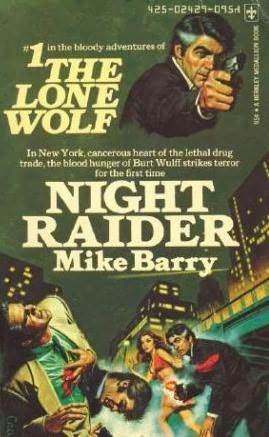 Barry N. Malzberg
Barry N. MalzbergBarry N. Malzberg's science fiction career began an agent for the Scott Meredith Literary Agency in New York in 1965, and he has seen the field from many angles, as reader, writer, editor, agent, and critic. He began publishing short stories in 1967, novels in 1970, and became known as a prolific writer of fiction that took a sardonic view of the meaning - or lack thereof - in individuals’ lives and undertakings, to the point of occasionally being labeled anti-SF in his outlook. Notable novels include Beyond Apollo (1972), winner of the first John W. Campbell Award; Herovit's World (1973); Guernica Night (1975); Galaxies (1975); and The Remaking of Sigmund Freud (1985). His many short story collections include The Passage of the Light: The Recursive Science Fiction of Barry N. Malzberg (1994) and In the Stone House (2000). His collection of critical essays The Engines of the Night: Science Fiction in the Eighties (1982) won a Locus Award.
"I have long maintained that Malzberg's portrayal of The Lone Wolf is one of the most brilliant in the genre. The slow build-up over the series more than pays off in the shattering finale. I'd give just one bit of advice to anyone reading the series from the beginning: Malzberg knows exactly what he's doing." --Jerry House"Since my so-called career, like that of most commercial writers, is little more than a function of what I could write and where I could sell it..." --Barry MalzbergAn Interview with Barry Malzberg
1
Ed. You wrote what you could write and sold it where you could...It's telling that at around the same time you were writing The Lone Wolf you were creating one of your finest most nuanced masterpieces Guerenica Night. I know you were a hard working pro...but that had to be quite a literary leap.
Barry. No, I felt that GUERNICA NIGHT was no "literary leap". Same writer, same urban decay, same obsession with death-as-purgation and for that matter same style. I wrote the first 10 Lone Wolf novels between January and October of 1973, then right on to GUERNICA NIGHT. Felt seamless.
2.
E. I'm not sure whether you or your agent came up with the idea to do a Mac Bolan-type series but what did you make of the genre after you read a few examples of it?
B.
. As I wrote in NOTES ON THE LONE WOLF (collected in Breakfast in the Ruins) I had never read an EXECUTIONER novel prior to signing the contract on LONE WOLF. I found one at the local candystore (paperbacks were sold in candystores, bus terminals, drugstores, gas stations in those roseate days) and spent an hour with it. Absolutely terrible, I thought, but added in the spirit of Schmeling viewing clips of Joe Louis before their first fight, "I see something." By the way
my editor George Ernsberger approached _me_; I had no thought of doing this series and was shocked at his solicitation. He saw something, obviously, that I had not seen in myself. (And also they wanted this series on the stands at the earliest instant to take advantage of the market trend and I was the only writer living or dead who could be counted upon to deliver ten novels in eight months.)3.
E. Did you consciously decide to basically turn the genre on its head. Wolfe and his vision are nihilistic. He sees that he is trapped in two hells--himself and what America has become. Nothing like this would ever occur in the avenger series by other writers.
B. Jerry House's quote is dead-on; I knew exactly what I wanted to do before I typed the first line and I proceeded with conscious intention. Burton Wulf got ever crazier by intention.
4.
E. What always fascinated me about The Lone Wolf Books was not the violence-which is considerable--but about the running commentary on how the American Streets were fighting a war parallel to that of the battle in Viet Nam. This gave Wulf a gravitas and harsh poetry none of the other avenger series had. You were SERIOUS
4. Yes, I was quite serious. I had at that time what I took to be a Social Vision. Synchronous to the composition of those first ten novels was the passage of the insane and insanely punitive Rockefeller drug laws in NY State which more or less mandated life sentences without probation or appeal for those convicted of selling drugs in any amount. Millions of lives were destroyed. The laws remain largely in effect almost four decades later. Rockefeller died - in the saddle with a girlfriend I would like to remind all - 33 years ago but his legacy for those under the penumbra of the drug laws is eternal.
5.
E. Did your publisher fight you for using the pretext of a men's action for a somber look at the grim unraveling of our country's tenuous grasp in civilization?
B. My editor fought me on nothing. George Ernsberger, a renegade, knew exactly what I was about and left me entirely alone. The publisher _was_ unhappy with the first three books; the characters murdered were depicted too vividly and sympathetically he thought and their deaths went beyond cartoon deaths...he wanted to stop the series. But for one reason or another he relented - my editor fought for me - and gave the greenlight for #4 and its successors and never bothered me again.
6.
E. I agree with you about drugs (I exempt marijuana). Tune in, tune out, right on bro etc--my generation's gift to the world was the utter destruction of the inner cities as well great damage to every other aspect of American culture. But you were saying this when it was unfashionable in the kinds of circles you and I traveled in. Did you get flack for it?
B. I got no flack for the series. I was a fat kid living with spouse and two young daughters in a suburban house, living in camouflage. The gap between the ferocity of those novels and the pallor of my daily life might have been astonishing if I had given it some thought but I didn't, not on a conscious level anyway.
7.
E. Wulf's world view is at times almost misanthropic. I think of what Eugene O'Neill said when first told about the Atomic bomb: "Maybe we deserve it." Or am I wrong?
B. Wulf's view was of course misanthropic. He was Sondheim's Sweeney Todd half a decade before the musical. "This world is full of shit and we are not out of it: you all deserve to die."
7.
E. Did you get much flack for the series?
B. I received one letter. Sic. A Sp4 in Texas mailed me the cover of #5, HAVANA HIT, with a brief note: "You can tear this into quarters and you know where you can stick it." My response: "You're a paying customer and beyond that you're a noncom in the US Army, you have my undying respect." I enclosed a copy of #6 CHICAGO SLAUGHTER "As a way of thanking you for expressing your opinion." I did meet few people at NYC paperback conventions who expressed appreciation. One asked me if the series was based on actual events.
8.
E. Did you get many reviews?
B.To the best of my knowledge, no contemporaneous reviews. Nice mention in Bill Pronzini's/Marcia Muller's THOUSAND AND ONE MIDNIGHTS but Pronzini is my, um, collaborator. Very nice mention too in ENCYCLOPEDIA MYSTERIOSA by the Edgar winning novelist William DeAndrea who died young so long ago.
9.
E. Are you ever invited to men's adventure meetings or conventions?
B. Other than those 3-4 NYC pulp Conventions I attended (brief signings) I've never been invited to any mystery-related function.
10.
E.How do you feel about having the books available in e book form on the great website Prologue Books?
B. I'm gratified to feel that they are still alive and available in however perilous a fashion more than three and a half decades after I typed FINIS to the series.
11.
E. I'd like to end this by asking you what was it like free landing full time in the years you did it? You produced an enormous amount of work, a good share of it that has not only endured but also been influential on succeeding generations. Does knowing that make your memories of all the long hours and scrambling ins search of work worth it?
B. That's an embracing question and difficult to answer. Ten years ago I would have responded flatly" Not worth it. In the words of Harry The Flat from my 1974 novel UNDERLAY "The fucking you get is not worth the fucking you take." Now I am not sure. The work is honorable because it emerged from an honorable perspective. The money was essential but it wasn't ultimately the money which was driving those books or anything else. I had big plans. Top of the world, Ma.
The literary father of so many of us - Ray Bradbury dead at 91
by ARNIE SEIPEL
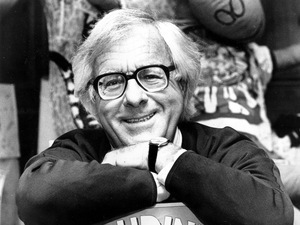 EnlargeLennox McLendon/AP
EnlargeLennox McLendon/APRay Bradbury's career spanned more than 70 years — during which he transported readers to other dimensions with his futuristic and innovative stories. He died Tuesday at age 91.
text size A A AJune 6, 2012Ray Bradbury, author of The Martian Chroniclesand Fahrenheit 451, died Tuesday. He was 91. Bradbury was known for his futuristic tales — but he never used a computer, or even drove a car.
Bradbury grew up during the Great Depression. He said it was a time when people couldn't imagine the future, and his active imagination made him stand out. He once told Fresh Air's Terry Gross about exaggerating basic childhood fears, like monsters at the top of the stairs.
"As soon as I looked up, there it was, and it was horrible," Bradbury remembers. "And I would scream and fall back down the stairs, and my mother and father would get up and sigh and say, 'Oh, my gosh, here we go again.' "
Hear Ray Bradbury On 'Fresh Air'Bradbury spoke with Terry Gross in November 2000Bradbury dove into books as a child. Wild tales from authors Jules Verne and H.G. Wells captivated Bradbury — and made him dream of becoming a great author. So he started writing, churning out a short story every week during his teens. After his family moved to Southern California, he would escape to the basement of the UCLA library. There, he'd focus on his craft.
"For 10 cents a half-hour you could rent a typewriter," Bradbury recalled. "And I thought, my gosh, this is terrific! I can be here for a couple hours a day. It'll cost me 30, 40 cents, and I can get my work done."
More On Ray Bradbury you must read thisBradbury's Tale: A 'Wicked' Read, A Haunted Book
you must read thisBradbury's Tale: A 'Wicked' Read, A Haunted Book
 books we likeBradbury Classic In Vivid, 'Necessary' Graphic Form
books we likeBradbury Classic In Vivid, 'Necessary' Graphic Form
 you must read thisBradbury's Fiction Reignites An Author's Faith
you must read thisBradbury's Fiction Reignites An Author's FaithBradbury made his mark in the literary world with The Martian Chronicles, a collection of short stories released in 1950. During the height of the Red Scare, he set off a warning flare about censorship with his signature work, Fahrenheit 451 — and he did so in a controversial new magazine: Playboy. The story was later printed as a novel, and in 1966 director Francois Truffaut introduced movie audiences to this bizarre society Bradbury created: one in which firemen burned books to keep the masses completely ignorant but couldn't extinguish their curiosity.
"Fahrenheit 451 is the temperature at which book paper catches fire and starts to burn," explains firefighter Guy Montag.
Oscar-nominated director Frank Darabont wants to bring a new version of Fahrenheit 451 to the big screen. He was inspired by the outlaws in the book — the people who worked desperately to preserve literature and pass wisdom along to future generations. Darabont wants to do just that — deliver this author's lessons to today's youth.
"Bradbury takes us into a journey to the core of the human heart and glories in the potential of humankind," Darabont says. "That's a great message to get at a time in your life when you're looking around and seeing that the world kind of sucks."
Bradbury saw his work more as social commentary than science fiction. And he found new ways to express his take on the world. He adapted a screenplay of Melville's Moby Dick and worked on TV shows like Alfred Hitchcock Presents and The Twilight Zone.
Ray Bradbury is one who is contributing to the understanding of the imagination and the curiosity of the human race.
- Astronaut Buzz Aldrin
But there was one medium Bradbury never embraced: computers. He once told The New York Times that the Internet was meaningless. And it wasn't until 2011 that Bradbury reluctantly gave in to his publisher's demands to release Farenheit 451 as an e-book.
Bradbury may have resisted modern technology, but he influenced plenty of innovation. The crew of Apollo 15 was so inspired by Bradbury's novel Dandelion Wine,they named a lunar crater after the book. Astronaut Buzz Aldrin said Bradbury's impact was universal.
"Ray Bradbury is one who is contributing to the understanding of the imagination and the curiosity of the human race," Aldrin said.
Bradbury suffered a stroke at age 80 and could no longer write — but he continued to dream. He was so certain mankind would land on Mars, he asked to be buried there. That may never happen, but it didn't stop him from believing it was possible.
Read an excerpt of Fahrenheit 451
June 5, 2012
A New Publisher: Seventh Street Books
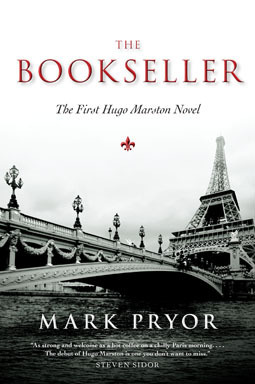
The Bookseller | Mark Pryor
October 2012
Max—an elderly Paris bookstall owner—is abducted at gunpoint. His friend, Hugo Marston, head of security at the US embassy, looks on helplessly, powerless to do anything to stop the kidnapper.
Marston launches a search, enlisting the help of semiretired CIA agent Tom Green. Their investigation reveals that Max was a Holocaust survivor and later became a Nazi hunter. Is his disappearance somehow tied to his grim history, or even to the mysterious old books he sold?....
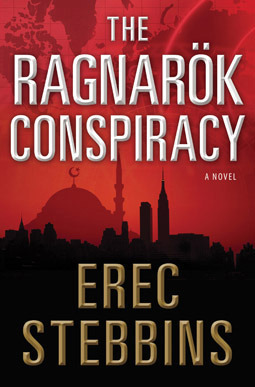
The Ragnarök Conspiracy | Erec Stebbins
October 2012
An American bin Laden. An FBI agent. Connected by a terrible loss on 9/11, they now confront each other over acts of vengeance so horrific, the world is brought to the brink of war.
As Muslims around the world are being targeted in a series of devastating attacks, agent John Savas is drawn into a web of international intrigue. He must put aside his personal pain and work with a man who symbolizes all he has come to hate. Both are drawn into a race against time to prevent a plot so terrible that it could shatter civilization itself.
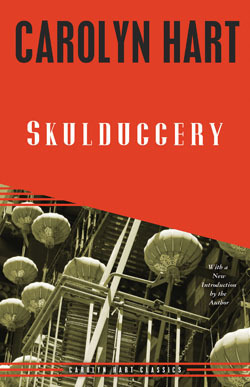
Skulduggery | Carolyn Hart
November 2012
Beijing, 1941: The ancient bones of the famed "Peking Man" areplaced in two wooden crates for shipment to the United States to escape the invading Japanese army. The bones are never seen again.
New York City, 1970s: a mysterious
woman offers to sell the bones to an unknown man on top of the Empire State Building. But when someone takes a photograph, she makes a hasty retreat and disappears forever....
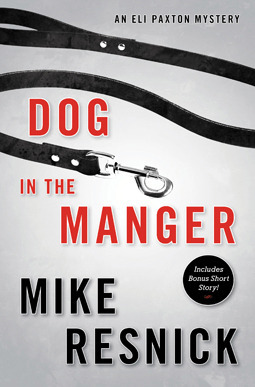
Dog in the Manger | Mike Resnick
November 2012
A dog is missing. Not just any dog. The number one Weimaraner in the country and current Westminster winner.
Down-on-his-luck private eye Eli Paxton is hired to find him. Not exactly an elite assignment, but better than nothing. Maybe it will help him pay his rent.
It turns out to be anything but a routine case. People start dying in mysterious ways, a cargo plane goes missing, and someone is taking shots at him. It makes no sense. Even a top show dog isn't worth that much...

The Cold Cold Ground | Adrian McKinty
November 2012
Spring 1981. Northern Ireland. Belfast on the verge of outright civil war. The Thatcher government has flooded the area with soldiers but nightly there are riots, bombings, and sectarian attacks.
In the midst of the chaos, Sean Duffy, a young, witty, Catholic detective in the almost entirely Protestant Royal Ulster Constabulary, is trying to track down a serial killer who is targeting gay men...
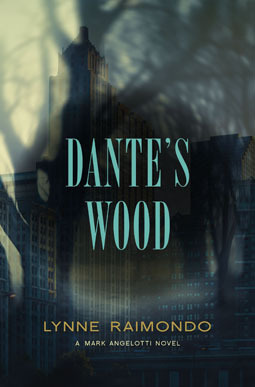
Dante's Wood | Lynne Raimondo
January 2013
Psychiatrist Mark Angelotti knows that genes don't lie. Or do they?
Back at work after a devastating illness, Mark believes he has put his past behind him when he is asked to examine Charlie Dickerson, a mentally handicapped teenager whose wealthy mother insists he is a victim of sexual abuse. Mark diagnoses a different reason for Charlie's ills, but his prescription turns deadly when a teacher is murdered and Charlie confesses to the police...
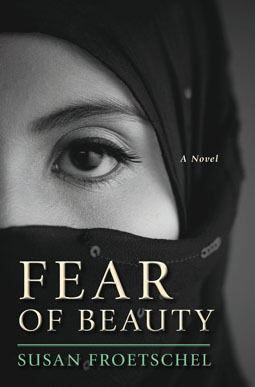
Fear of Beauty | Susan Froetschel
January 2013
Sofi, the boy's illiterate young mother, is desperate to find the truth about her son's death. But extremists move in and offer to roust the "infidels" from the region, adding new pressures and restrictions for the small village and its women....
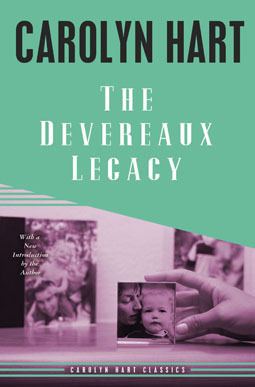
The Devereaux Legacy | Carolyn Hart
February 2013
Leah Devereaux is a dead woman. At least, that's what the folks now running the Devereaux plantation tell her: Leah has been presumed dead for nineteen years—since the day that both her parents died.
Leah, very much alive, has returned to South Carolina to uncover the untold story of her parents' deaths. While some, like her cousin Merrick, welcome her, Cissy and John Edward tell her to stay away, tell her to stop meddling in secrets long kept....
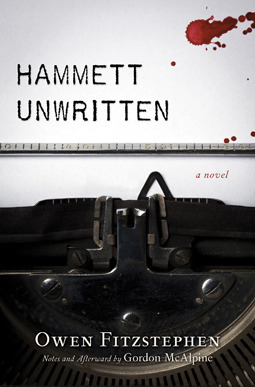
Hammett Unwritten | Owen Fitzstephen
February 2013
A worthless bird statuette—the focus of Dashiell Hammett's The Maltese Falcon. And much more.
As Dashiell Hammett closes his final case as a private eye, the details of which will later inspire his most famous book, he acquires at a police auction the bogus object of that case, an obsidian falcon statuette. He casually sets the memento on his desk, where for a decade it bears witness to his literary rise. Until he gives it away.....
"Meticulously researched and beautifully written, The Ragnarök Conspiracy turns the traditional terrorist thriller on its head. Erec Stebbins's debut novel signals the arrival of a monster new talent in the thriller genre."
Author of The Lonely Mile
CLICK HERE for more...
Amazon Buys Avalon Books, Publisher in Romance and Mysterie
Amazon.com has expanded its publishing reach again by acquiring Avalon Books, a small, 62-year-old publisher that specializes in romance and mysteries.
The purchase includes more than 3,000 back-list titles, Amazon said, adding that the books will be published under Amazon’s imprints based in Seattle.
Financial terms were not disclosed.
Ellen Bouregy Mickelsen, the publisher of Avalon Books, said in a statement: “I’ve been running Avalon Books – which was founded by my father — since 1995, and it is time for me to explore the next chapter of my life. I chose Amazon Publishing because they care deeply about the writers, readers, and categories that have long mattered to our family business and they are uniquely positioned to assure that our titles make the leap forward into the digital future.”
Amazon made a similar move last December when it acquired hundreds of titles from Marshall Cavendish Children’s Books.
June 4, 2012
Gorman's weekend Nook News
 Harlot's Moon - A Robert Payne Mysterywww.barnesandnoble.comAvailable in: NOOK Book (eBook). Cedar Rapids, Iowa. A Catholic priest has been found half-naked and dead in a seedy motel room, with his tongue cut out. Ex-FBI profiler Robert Payne has been called in to investigate by his childhood
Harlot's Moon - A Robert Payne Mysterywww.barnesandnoble.comAvailable in: NOOK Book (eBook). Cedar Rapids, Iowa. A Catholic priest has been found half-naked and dead in a seedy motel room, with his tongue cut out. Ex-FBI profiler Robert Payne has been called in to investigate by his childhoodFamily Plot
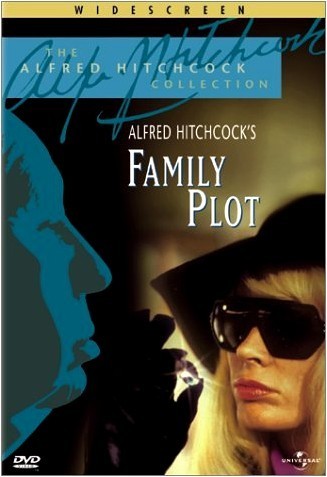
FRIDAY, FEBRUARY 15, 2008
Fake medium Madam Blanche (Barbara Harris) and her taxi driver boyfriend George (Bruce Dern) make a living by scaming people with her phoney powers. They are hired by an aging widow, Julia Rainbird, to find her nephew who was given away for adoption many years earlier following a family scandal. Meanwhile, an extremely clever couple, diamond merchant Arthur Adamson (William Devine) and his attractive girlfriend Fran (Karen Black), are behind a series of kidnappings of various VIPs in the San Francisco area. The two couples paths soon cross and chaos results in Hitchcock's last film. Written by Col Needham {col@imdb.com}
Ed here: On his fine blog Martin Edwards makes some interesting points about the late work of Alfred Hitchcock. I agree with him about Topaz. It's the only Hitchcock movie I ever felt like leaving early.
In passing Martin makes a favorable comment on one of my favorite Hitchcock pictures, Family Plot, the outline for which I've posted above. With one exception--Hitchcock's rather clumsy and incessant use of rear-screen projection--I'd put this in his top ten.
Barbara Harris and Bruce Dern are Sixties street people who are in fact hippie criminals. Harris is endearing in a whacked out way; Dern is as usual dour, suspicious, pissy. He's almost as good as James Garner at playing pissy (Rockford had to be the pissiest PI of all time, no small part of his charm and believeability--you wouldn't be pissy if you had a friend like Angel?).
William Devane is all teeth and arrogance as a self-described master thief and Karen Black erotic and fascinating in her Karen Black way.
The plot ingeniously brings these two couples together as their combined machinations lead the audience to a brilliantly staged third act twist.
This is one of those oddball little charmers that the mainstream critics of the time just didn't seem to understand.
Ed Gorman's Blog
- Ed Gorman's profile
- 118 followers


